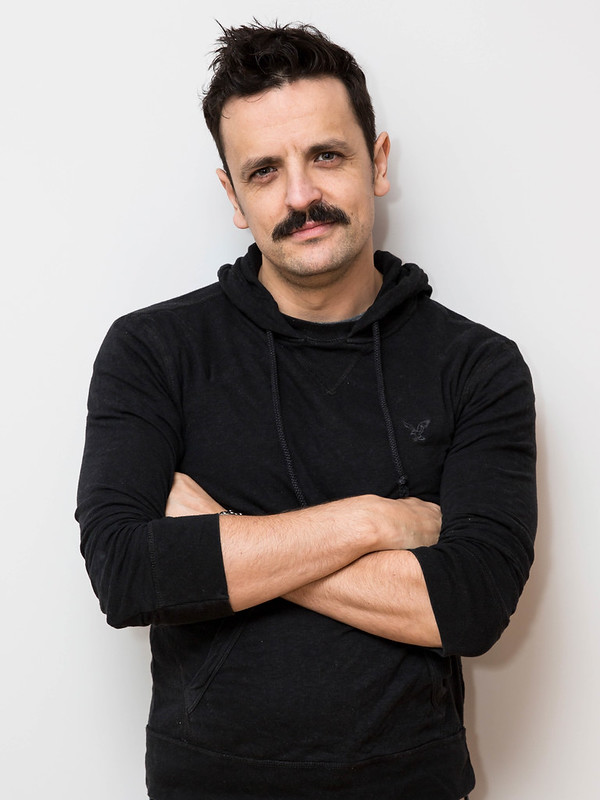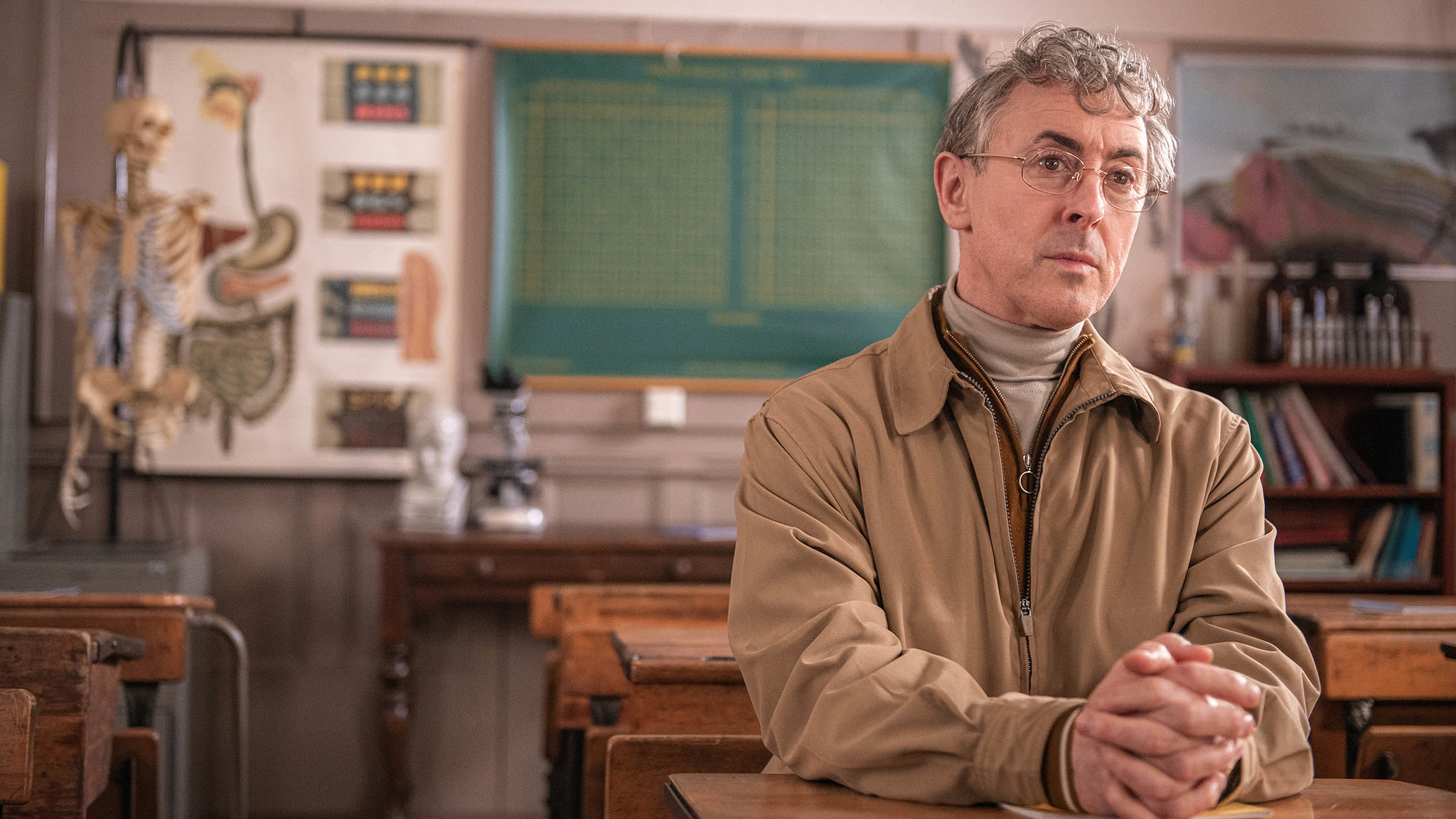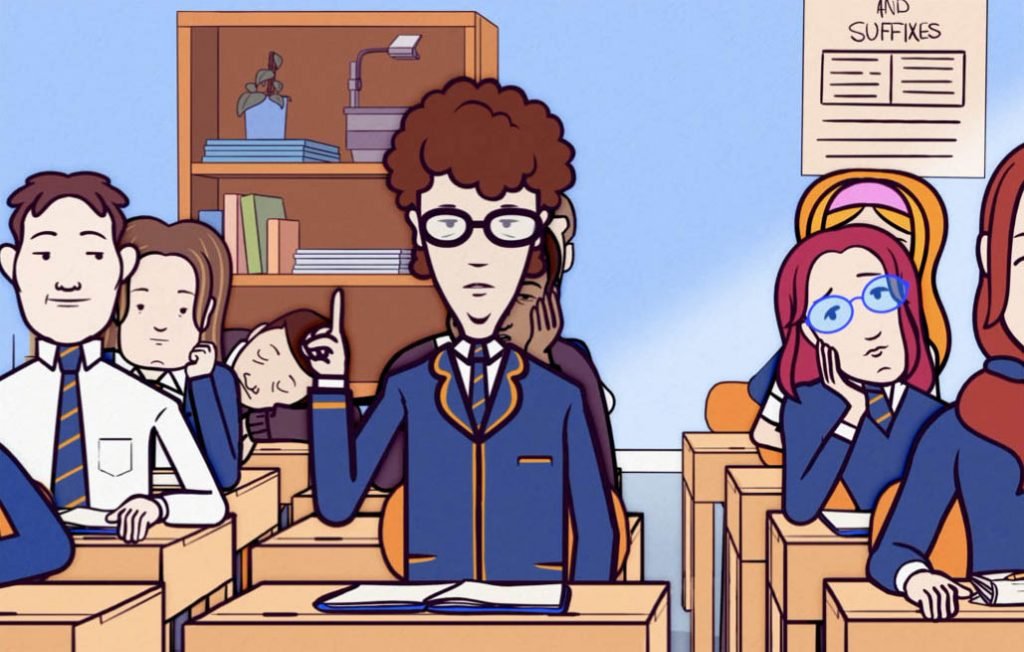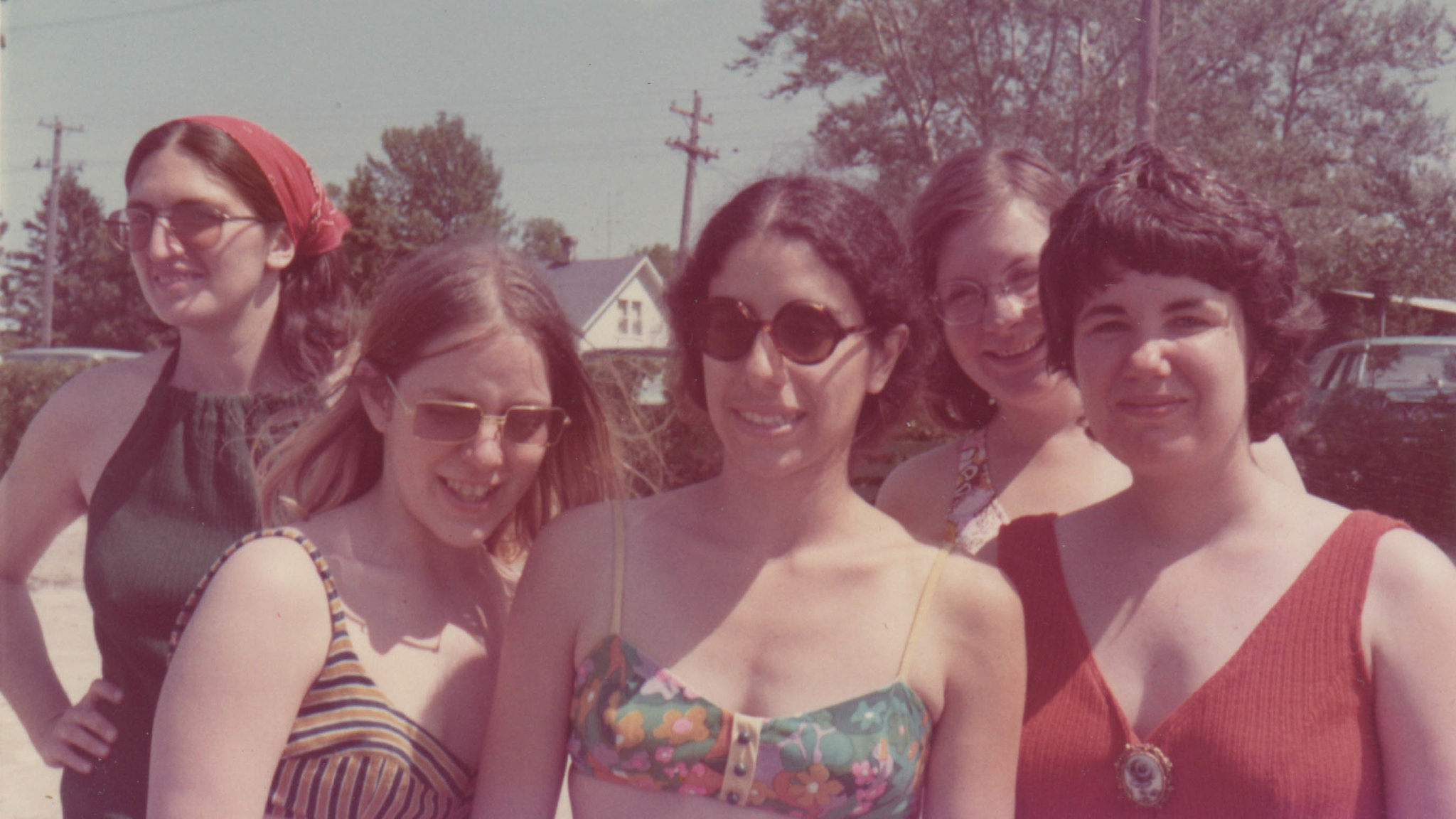Jono McLeod stages a most unusual high school reunion in My Old School. This strange-but-true doc premiering at this year’s Sundance Film Festival sees McLeod reconnect with his classmates to revisit the events that put their class in the headlines in 1993. My Old School playfully recounts the story of Brandon Lee, whom teachers at McLeod’s Glasgow school introduced as a new student joining their class. Besides sharing the name of the recently deceased star of The Crow, McLeod and some of his classmates found Lee a little funny. But kids being kids and high school being high school, they looked the other way and eventually found Lee’s quirks endearing.
Lee returns to set the record straight (ish) in an interview with McLeod. However, in a novel twist, Lee’s condition is that he not appear on camera after enduring years of public scrutiny. Lee appears in the form of Scottish actor Alan Cumming (“The Good Wife”), who seamlessly brings the subject’s words to life through a dramatic lip sync. Lee’s strange tale takes viewers through the performance that conned a school and a suburb, while McLeod’s classmates reconsider their mate who took a peculiar risk to pursue his dream, landing the lead in the school production of South Pacific and drawing praise from teachers along the way. It’s a wild tale told with dramatic panache that asks audiences to suspend their disbelief in a tale of twists, turns, and jaw-dropping revelations.
POV spoke with McLeod and Cumming ahead of My Old School’s Sundance premiere to discuss lip syncs, second chances, and the growing pains of high school.
POV: Pat Mullen
JM: Jono McLeod
AC: Alan Cumming
This interview has been edited for brevity and clarity, and to remove spoilers.
POV: Alan, you were previously supposed to play Brandon Lee in the film Younger than Springtime in the late 1990s. What happened to that project?
AC: It just sort of fell apart, like many films do. I was going to direct it, and I was actually in America by that time. I remember being excited about doing, it just fell away, but you have to be sanguine about these things, especially in independent film world. It was amazing that, years later, Brandon’s story came back into my life.
POV: When you say you wanted to direct it, that would have been your first feature, correct? What made you want to do both roles in front and behind the camera?
AC: It would’ve been my first feature, but I’d directed a couple of shorts before and a couple of features since then. Sometimes I don’t think it’s great for actors to direct themselves, but if the character is so integral to the main thrust of the plot, then it makes sense to have the same person do both if they can. That’s what I felt about that film, I think, and I was young enough that I could be the same age that Brandon was.
POV: And when you were asked to do the role twenty years later, what made you say yes?
AC: Jono is a friend of mine. When he told me what he was working on, I said that I was going to play him in a film once. He said, “Yes, I know.” [Laughs.] It just felt like it came full circle. Obviously, Jono tells the story of what happened in this documentary, but he also asks all these questions about how people react when they feel betrayed. To me, it becomes much more about the classmates and about us as society. Brandon Lee was never arrested. What he did wasn’t a crime. The film asks all these questions about what is right. Would you trust someone who did what he did? I love when a story branches off into strands that compel you and challenge you.

JM: That was very much the process of how it was made in that I went into it thinking it was one story and come out the other end, realizing that it was wasn’t the story that I thought it was. It was like unpeeling an onion. The film was three-and-a-half hours long at one point!
POV: Did you approach Brandon or did he ask you to tell his story?
JM: I reached out to Brandon. I hadn’t been in touch with him since school and he’s done interviews over the years. As you see in the film, he was prepared to be in front of a camera back in the day, but now he. It’s not about being in a movie or making money—he’s not interested in that. He is interested in furthering his education and getting to a new point in life, and if getting his story out can help him do that, then he’s willing to put his story out there. He just had one proviso: he didn’t want to be on camera. It’s a condition he’s given to other to press interviewers in recent years. That was almost a challenge that he sent me. I couldn’t have dreamed that I would convince Alan to do it and that he would do it so amazingly well.
POV: What’s the challenge of creating a character when the line delivery is already done, Alan?
AC: I’ve seen and been aware of Brandon for so long, and then I listened to the interview in its entirety. I’m not trying to impersonate him visually—I just look that glamorous because we felt that was how we wanted to do him. I had to let him seep through and he’s implacable. When you see his interviews, his face doesn’t move that much, and yet he has quite an animated voice. It was a weird thing to do. I have a joke about at my bar, at Club Cumming in New York, that if we’re gonna have drag queens lip-syncing, they had better know the words. There’s no excuse for a lip-syncing drag queen who doesn’t know the words. I feel I can now throw the gauntlet down and say, “Look, you bitches! Look at this movie for lip syncing!” [Laughs.]
But, really, once you get someone’s speech patterns, you can do them again and again and again. The takes in the film are obviously the best versions. We didn’t even do takes, really. We just ran it and ran it because Jono had scripted the film by that point. The character was already there in his voice and I just had to put my body around it to make it whole.
POV: Did you direct Brandon in the interview, Jono? He has such a great dramatic flair.
JM: He’s told this story so many times over the years. He’s really eloquent and obviously a highly intelligent guy. He has written about his experiences and I think formulated it a version of events that really lends itself to telling a story in this way. The interview was just a straight interview that went for five or six hours. It was the first thing that we did.
POV: What about the South Pacific performance struck you as sort of a key ingredient to the film and Brandon’s story. Alan, were you able to see that high school production on the videotape before doing your performance?
AC: Yes. Jono had sent various versions of the cuts and I’d seen a lot of research material. I went into the studio and recorded the song a long time later. I recorded him singing “Younger than Springtime.” That was weird because you’re singing a song as someone else who is pretending to be someone else. Then I did one version as me. Something for the DVD extras! [Laughs.]
JM: It felt like such a waste not to. Here we have the King of Broadway singing our show tune in our movie and disguising his voice. Here’s this King of Broadway, who’s not actually that up on his musical theatre, too!
AC: I really don’t know many Broadway songs. Everyone thinks I should know everything. Once at Marie’s Crisis, they asked me and Darren Criss to sing a song and I was like, “What should we sing?” He said what if we did a duet of “I Don’t Care Much,” which is a song I sang in Cabaret. We’d been drinking and so we get up, Darren starts playing, and we start singing. I forget the words. I can’t remember the words. It was the funniest thing because this whole bar of homosexuals, show queens, and those who love them are all going like this [mimes people gasping and covering their mouths] and then started to mouth the words of a song that I made famous. It was a very salutary lesson.
POV: A good lesson in lip-syncing! And for you Jono, what caught your attention with the South Pacific story?
JM: My friend, Sean, says in the film that that the musical was a real turning point for Brandon in the school year. I’ve got Alan Cumming, going to sing it and that’s the crescendo we’re building towards: the point where things really changed for Brandon. It’s the natural crescendo for Brandon’s time at the school.
POV: And what do you think Brandon’s story teaches us about second chances?
AC: I think it’s actually more a story of third or fourth chances in a funny sort of way. On the way to getting what you want, you inadvertently do some potentially terrible things, but you also really can help people. I think that’s the biggest revelation about the film for me. Some people really blossomed because of Brandon. Are people going to deny him that? Are people going deny them that? I love the fact that he’s never quite given up his dream. Personally, I feel we should be more indulgent of people who have slipped through the cracks and for whatever reason didn’t get to do what they wanted to do the first time, as long as they’re not committing any crimes. This is where the film’s really interesting. There’s a moral crime, you might say, but I think we should let people have a go if you can really help people.
JM: It’s an interesting question that we ask the other “kids” at the end of the film: how they feel about the idea of “Dr. Brandon”? Everybody has a different take on it. I’m pleading the fifth on this one and taking a documentary filmmaker stance and letting everybody else decide from that. I did not want to rush to judgment on Brandon. I’m fascinated to hear what the audiences will make of that.
POV: If you could put yourself in Brandon’s shoes and redo a certain point of your life, would you?
JM: The question that everybody always asks me when I tell this story is, “How did you not know?” My answer is that when you’re a gay 16-year-old kid in 1993 high school, you’re so focused on your own issue and your own secret. There’s no way you’re gonna be able to clock that there’s somebody in your class who shouldn’t be there. Your teacher tells you here’s this person and he’s a new student. I had enough going on trying not to get beaten up in the playground, so I had enough to worry about.
AC: If I needed to go back in my life and get something that I needed to carry on and to do what I wanted in life, I probably wouldn’t go back to the place where I had failed at it. That’s what’s so crazy about this story. He could theoretically have gone to any high school in Scotland with that story or community college or night classes. Why did he put himself in the lion’s den? That’s fascinating to me. There’s things I’ve done wrong and things I’ve wished I’d done better, but I don’t particularly want to go back and redo them.
POV: I want to ask about the other great performance in the film, which is Lulu. How did she become involved to play the teacher?
JM: I’m one of the world’s biggest Lulu fans. On Spotify Wrapped, she’s my top artist every year. I was at the theatre about five years ago, and the lights were about to go down for the show to start. There were two empty seats beside me, and this couple came shuffling. I’m like, “Jesus Christ, it’s Lulu.” I did the embarrassing thing after the show and told her what a big fan I was. She was super sweet and we kept in touch.
She actually reminds me of the character she plays a little bit. She’s diminutive, but knows how to shout. The To Sir, with Love connection is obviously never far from the mind with Lulu. We actually recorded it at my home studio. I live in the part of East London where she filmed To Sir, with Love in the ’60s. It was a cute moment seeing Lulu step out of the taxi into East London streets where this had happened all these years before. She had no memory that she filmed it there, and had to be reminded. For the song at the end, I knew that the film had quite a sombre end, so I wanted a moment to lift everybody up and get back to the fun they had. I think she’s just an amazing job.
POV: What was the inspiration for the aesthetic of the animation?
JM: We had a shoot scheduled with Alan for March 2020, then everything changed. We went down a rotoscope route where we had an actor who was gonna play Brandon. We found a younger Alan, a Welsh actor. Olivier-nominated.
AC: I call him Younger Hotter Welsher Me
JM: Yes. [Laughs.] We tried filmed that on a green screen and did a rotoscope effect on it, but something was a bit off. We couldn’t get people to buy into it, so I had to go back to the drawing board. Then I watched Wandavision on Disney+, and I was blown away by the production design and the direction where every episode is a different era of television. They really nail it. I wondered if there was a way to do it with simpler animation and reached out to animators. Daria was an influence—Brandon lends himself to that because he’s got big curly hair and glasses. There’s a reference to King of the Hill and we were flashing back to the ’70s to look at things like the Archie show.
POV: What advice would you have for people struggling with high school now?
JM: Don’t go back for a second!
AC: It’s hard when you’re young to remember that things will end. If you’re in a bad situation, it will come to an end. If you’re being bullied because you are standing out, then actually you’re the brave one because you’re being authentic and being prepared to be yourself. You’ll understand as you grow older, that is a much better quality to have and is much better life skill than being a bully.
My Old School premiered at the 2022 Sundance Film Festival.














